#upthebaguette
Text
france is burning.
667 people were arrested last night. they are curfews in place. public transport is partially closed at night.
nahel, a 17-year-old, was shot tuesday by the police during a traffic stop. he wasn't violent or armed, he wasn't a threat. but he broke the law and tried to drive away, so the cops killed him.
and now france is rioting.
there is a video so the government isn't trying to deny the facts for once. but the minister of the interior (in charge of the police) still insist that the police shot less people since the 2017 law on public safety.
but an analysis of police statistics by Le Monde, the most read newspaper in france, says otherwise. when the police shot on average 250 people each year in the five years prior to 2017, that number became 297 after 2017. for shots fired specifically on moving vehicles, the average used to be 119 and it's now 150. before 2017, there was an average of 0.06 deaths per shot. now it's 0.32.
more than ever, the police shoots to kill.
so france is burning.
#i wanted to write something small because there's nothing on tumblr#but it became longer and longer#i didn't add pictures bc it always seems voyeuristic to me. this isn't click bait. i'm not here to exploit the pain and the anger in any way#but a kid died and hundreds people are being arrested and tumblr doesn't say a word#upthebaguette#whatthefrance#acab#tw death#tw police brutality#france things
7K notes
·
View notes
Text
I see a lot of incomprehension online about our pension reform and the anger it generates in France, and what it often boils down to is "why are they so angry, 64 is plenty young to retire?"
I don't agree, but even if I did I would still oppose the reform. Here are some of the reasons why:
We already need 43 full years of work and tax contributions to be able to retire. Which means college-educated people were never going to retire at 64 anyway, let alone 62. This reform is aimed at people who start working early, mostly in low-paying jobs.
There's very little provision made in this law for hard/dangerous/manual labour.
There's no provision made for women who stop working to raise their children (51% of women already retire without a "complete career," which means they only retire on a partial pension, vs. 25% of men).
At 64, 1/3 of the poorest workers will already be dead. In France, between the richest and the poorest men, there's a 13 years gap in life expectancy.
Beyond life expectancy, at that age a lot of people (especially poorer, non-college educated) have too many health-related issues to be able to work. Not only is it cruel to ask them to work longer, if they can't work at all that's two more years to hold on with no pension
Unemployment in France is still fairly high (7%). Young people already have a hard time finding work, and this is going to make things even harder for them
Macron cut taxes on the rich and lost the country around 16 Billions € in tax revenue. Our estimated pension deficit should peak at 12 Billions worst case scenario.
While I'm on wealth redistribution (no, not soviet style, but I think there should be a cap on wealth concentration. Nobody needs to be a billionaire.): some of the massive profits of last year should go to workers and to the state to be redistributed, including to fund pensions. The state subsidized companies and corporations during the pandemic, Macron even said "no matter the cost" and spent 206 Billions € on businesses. Now he's going after the poorest workers in the country for an hypothetical 12 Billions??
Implicit in all of this is the question of systemic racism. French workers from immigrant families are already more likely to have started their careers early, to have low-paying jobs, are less likely to be college-educated, more at risk for disabilities and chronic illnesses, etc., so this is going to disproportionately affect them
This is not even touching on the fact that he didn't let lawmakers vote on it, meaning he knew he wouldn't get a majority of votes in parliament, or that 70% of the population is against this law. Pushing it through anyway is blatant authoritarianism.
TL;DR: This is only tangentially about retirement age. The reform will make life harder for people with low incomes, or with no higher education, for manual workers, for women—mothers especially, for POC, for people with disabilities or chronic conditions, etc. This is about solidarity.
Hope (sincerely) this helps.
#long post#france#french politics#réforme des retraites#49.3#pension reform#macron explosion#I know this post is mostly me talking to myself and preaching to the choir#but I needed to get it off my chest#up the baguette#upthebaguette#social justice
8K notes
·
View notes
Text

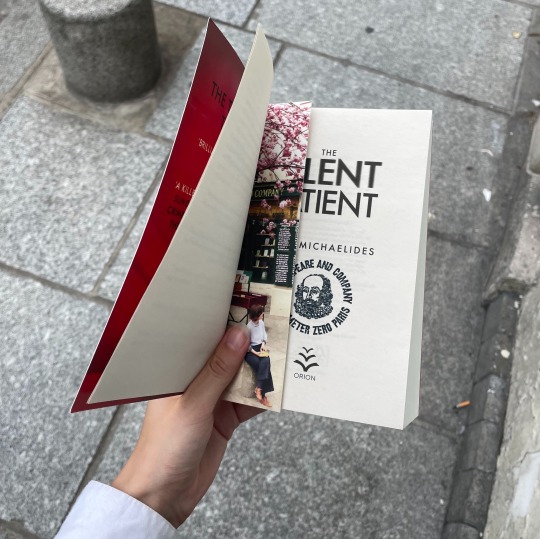


On Sunday I got a copy of the Silent Patient from Shakespeare & Co. Despite it being incredibly touristic I actually really love coming here! People rarely spend a lot of time upstairs, so it’s always so nice to use the reading spaces to go through a quick poetry book or to do some journaling :-)
#I read through a collection of french love poems and learned the word ‘le radada’ 🤠#Paris#studyblr#light academia#cottagecore#studyspo#dark academia#bookblr#romantic academia#shakespeare and company#upthebaguette#books & libraries#books & reading
2K notes
·
View notes
Text
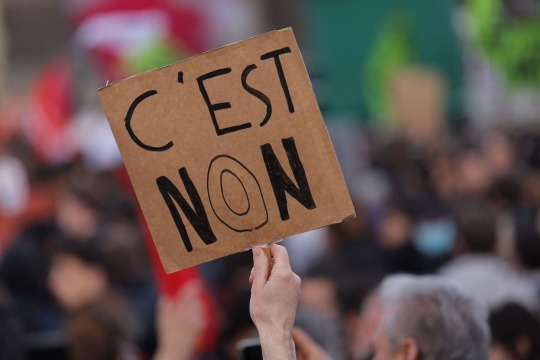








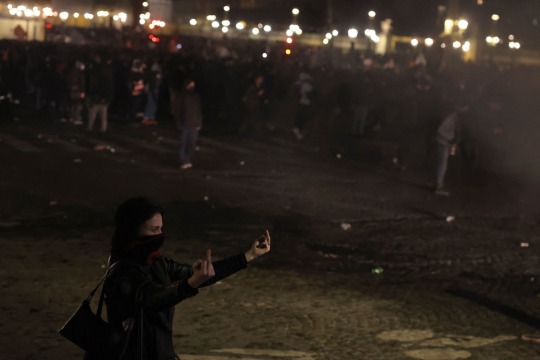
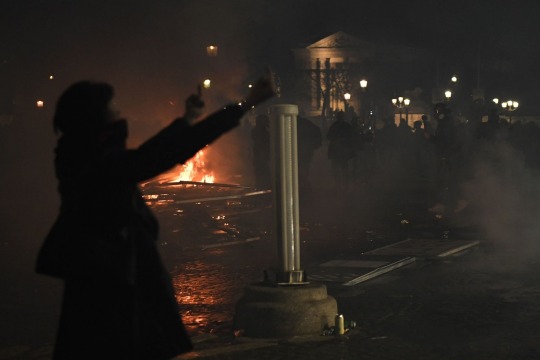
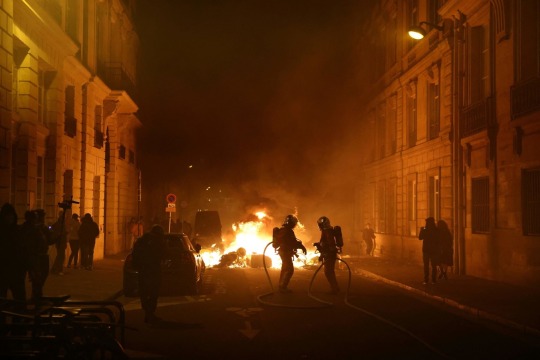

Protestors demonstrate and light fires at Place de la Concorde after the French Government pushed their Pension Reform through France's Parliament without a vote after enacting article 49.3 of the constitution, in Paris on March 16, 2023.
3K notes
·
View notes
Text
I really HATE the censorship on social media because it's now getting in everyday language. I talked about it in another post but in French, you swear all the time and notably to show people you're close and surely we can't be the only ones. I really feel like it's an americanism not to allow people to casually swear so let's check this out.
Feel free to add your 1st language I'm really curious
293 notes
·
View notes
Text
Y a le Washington D.C. et puis y a le Washington de là-bas
773 notes
·
View notes
Text
I will never get over the French name for a grizzly–polar bear hybrid :
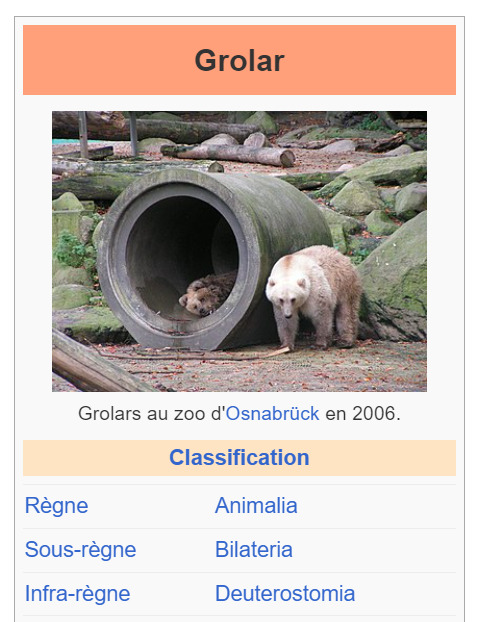
(For those who don't speak French - grolar sounds like "gros lard" which is the French equivalent of "fat ass")
280 notes
·
View notes
Text

Françaises, Français, mes chers compatriotes.... Sujet de tension et de controverse, on se retrouve cette semaine afin de déterminer où commence le Sud de la France hexagonale.
J'ai donc placé 7 lignes sur cette carte à des endroits où potentiellement faire commencer le Sud. Votez ce qui s'en approche le plus pour vous et n'hésitez pas à préciser dans les tags si mes découpages ne vous conviennent pas.
#je commence : je suis du nord et si t'es pas du nord t'es du sud. voilà.#france#upthebaguette#what the france#tumblr français#french side of tumblr#frenchblr#frenchposting#polls#my polls#sondage
586 notes
·
View notes
Text
Our president is having a casserole problem, and the advertisers show they have a better understanding of French people than he does.
Ikea edition:

Emmaus edition:

1K notes
·
View notes
Text

Translation of the text on the top of the pic': there are 12 different ways to write the 'S' sound
Translation of the text on the bottom of the pic': Not bad, huh? It's French.
#ok on abuse un peu mais si on peut plus rigoler maintenant aussi#ah~ l'orthographe#french post#upthebaguette#french side of tumblr
327 notes
·
View notes
Note
Hi! I’m starting to learn French and one thing that’s both cool and weird to me is how everything is gendered in a way (referring to someone/whose saying the statement/etc.) and I was wondering how that relates to people who identity as non-binary or gender fluid in France? Are there equivalents to they/them pronouns or neo pronouns in French?
I do plan on doing my own research about this but I figured since I love your blog and you’re really open about different cultural lgbtq+ communities I’d try here first!
That's an awesome question... with a complicated answer lmao. So buckle up and bear with me !
Basically, you can't be non-binary in French. The community found ways to do it but it's not mainstream. Most of the time, they're going to get misgendered or will have to misgender themselves to get understood.
Some things I'm going to list here are not proper French. Actually, they can even be forbidden in some circumstances, according to the law (the use of inclusive language, and more specifically le point médian, was made illegal in schools in 2021 for ex) or simply because your company etc forbids it. So use this wisely, there is a time and place for inclusive language in France.
That said, things have greatly developed over the last two decades. Which was partly because of the queer community and mainly because of feminists, who are tired of the way French erases women. More and more people are using inclusive language, at least in some circumstances and circles (for ex, i wrote my master's thesis in inclusive language and it was accepted bc i was in a leftist faculty). And inclusive language is debated as a serious issue now, which is saying something.
So, how do you use inclusive language in practice?
There are different ways, as it's informal and mostly new. People are still testing new things and trying out various methods. You can stick to one or alternate or mix them up.
Pronouns
Officially, there isn't a gender neutral pronoun. We don't have an equivalent to they. You're either talking about a man or a woman. If it's both, you use masculine pronouns ("masculine trumps feminine" rule). Same thing if you don't know the gender of the person ("masculin générique").
The most common neopronoun is "iel" (plural : iels), which is obviously a contraction of the masculine pronoun "il" and its feminine equivalent "elle". It works for nb folks or to avoid talking about someone's gender or to refer to a group of men and women. So it's equally used by the queer community and feminists.
I'm pretty sure other neopronouns exist but I can't think of any at the top of my head.
Choosing the right words
Sometimes, inclusive language is just about learning to use alternatives.
Instead of using gendered words, you can choose to use gender-neutral words or words "épicènes", aka words which are identical in their feminine and masculine form. For ex, instead of "homme politique" or "femme politique", you can use "personnalité politique". Personnalité is a feminine word but it's actually gender-neutral as you can use it for women and men alike. "Élève" (student) is épicène, as a female student and a male student are both referred to as "élève". Although épicène words as a gender-neutral option only work in their plural form, as you have to choose either a feminine or masculine article for the singular ("les élèves" is inclusive but it can only be "un" or "une" élève).
As good as this method is, it can be quite limitating. Your vocabulary will be drastically reduced and it can be quite hard to master that kind of speech so you can reach the point where you don't have to think everything over for ages before you open your mouth.
With oral French, you can take it a step further by choosing words that sound the same even if they have a different spelling. Ex, friend is "ami" or "amie" but it's pronounced the same way so if you say it out loud, people can't know how you're gendering it (as long as there isn't a gendered article/word with it ofc).
It avoids misgendering people but the downside is that, as masculine is considered neutral in French, people will often think : no gender specified = masculine. Not even because they're sexist or whatever, it's just so ingrained in our brains that it's a knee-jerk reaction.
That's also why most feminists often prefer to use explicitly feminine words when talking about women. For ex, they prefer the word "autrice" to "auteure" (female writer) because the second one sounds the same as its masculine version "auteur". And as previously mentionned, out loud, people will assume by default you're talking about a man. It's a big debate though, lots of women prefer words that sound masculine - going as far as refusing to use feminine words at all! Which sounds cool and gender-bending as fuck but in reality comes from feminine words traditionally seen as less legitimate and serious. Even today, if you look up the word empress "impératrice" in a French dictionary, the first definition that comes up is "wife of an emperor". "Woman ruling a country" comes second. Using a masculine title to refer to women can also be a way to mock them and show they're not welcome (a french deputy got fined in 2014 because he called the female president of the national assembly "Madame le président" and refused to use the feminine title "Madame la présidente").
Recently the tendency and official guidelines have been to feminize words, so I'd say go with that by default, but respect other people's choice if they specify how they want to be called.
Anyway I'm getting off-track but what I meant was that in French, if you avoid talking about gender, you're automatically erasing women (and nb people). So if you want to include everyone, you need to make it obvious.
Inclusivity as a statement
The most common way to make women and men equally visible is the "point médian" rule, which you can also use to refer to non-binary people as it avoids picking a specific gender.
Basically, it means pasting together the masculine and feminine forms of a word and using dots/middle dots/hyphens/parentheses/capital letters to create an inclusive word. For ex, instead of saying acteur (♂️) or actrice (♀️) for actor, you'll write "acteur.ice". For the plural form, there are two schools of thought : either you separate the feminine and masculine form AND the suffix used to signify the plural, or you don't. Aka, "acteur.ice.s" or "acteur.ices". Personally I prefer the second option because less dots makes it easier to read and faster to write, but it's an individual choice, both work.
There are two major downsides to this method : it only works in writing + it isn't doable for every word, as feminine and masculine words can be quite different and pasting them together that way would be unintelligible. Ex, "copain" and "copine" (friend or boyfriend/girlfriend depending on the context) would give something like "cop.ain.ine"...
You can work around that by choosing alternative words (as previously stated!). And it's still a pretty good method, especially as it works for any type of word (adjectives etc). Some people argue that it's hard to read and ugly but personally I think it's just a matter of habit (although it does pose a problem for people using screen readers). Be aware that it is the most controversial version of inclusive writing, as it's the furthest structure from how languages typically work.
If you don't like dots or want an alternative for oral speech, you can also straight up create new words that sound both feminine and masculine, making them gender-neutral. To use the previous example, "copain" and "copine" become "copaine".
Obviously, this only works if it's obvious which words they're based on. I think it's a great way to make French more inclusive but I'd advise against using it with uninitiated people as it would probably confuse them more than anything. This method is still quite niche.
An inclusive, yet binary language
As you've probably figured out, inclusive language remains quite binary in the way we approach it. It's more about making things both masculine and feminine than transcending gender and creating gender-neutral alternatives. Probably because inclusive language was more often a will to stop women from being erased rather than a non-binary friendly gesture.
Which means, there are also some rules that were created to avoid the "masculine trumps feminine rule" but don't allow room for non-binarity at all. I'll still explain them because they're interesting and you might encounter them at some point.
The proximity rule ("règle de proximité") is one of these. It existed in Ancient Greek and Latin but was dropped in Modern French in favor of the masculine trumps feminine rule. Basically, you gender things according to what's closest in the sentence instead of systematically using masculine words to gender a mixed group. For ex, instead of saying "Les hommes et les femmes sont beaux" you say "Les hommes et les femmes sont belles", as the subject "femmes" is closer to the adjective "beau/belle" than "hommes".
Another method is to systematically use both masculine and feminine words (which I personally find excruciating to write and read). Meaning, instead of writing "Les étudiants mangent à la cantine" (students eat at the cafeteria), you'll write "Les étudiantes et les étudiants mangent à la cantine".
This is mainly for the subject of the sentence : adjectives and such are gendered according to the masculine trumps feminine rule. The point is to explicitly include women, not to make the sentence unintelligible or gender-neutral.
When following this method, you also have to pay attention to whether you put the feminine subject first or the masculine. The rule is to follow alphabetical order. For ex, in "l'égalité entre les femmes et les hommes", "femmes" comes first because F comes before H. But in "Les auteurs et les autrices de roman", "auteurs" comes first because E comes before R. Etc.
This method is common as it's the only inclusive language you can get away with, given that it's a valid way of speaking French. It's even mandatory in some situations now, like in job descriptions for the french administration, in the spirit of gender equality.
So, how do I gender a non-binary person?
In short, you can use the pronoun iel + avoid gendered words and/or use the point médian and/or make up new words.
But keep in mind that if you're not talking to someone familiar with these rules, you'll have some explaining to do. And looots of people are still very anti inclusive language, because they're sexist and/or transphobic, ignorant, language purists, etc. A few years ago it was the thing to be angry about for conservatives and anti-feminists so it's still very controversial. But if you're in a trans inclusive queer space or talking with intersectionnal leftists, go for it !
I hope I covered everything (fellow french, don't hesitate to comment!) and didn't put you to sleep lmao. If you want to see some examples, you can look it up on Wikipedia or check #bagaitte on tumblr (it's the french queer tag) 😉
#it's a slow but steady effort!#the fact that it was accepted by my uni teachers shows how far we've come already#a decade ago it would have probably been dismissed#i don't even know if i was aware this existed a decade ago#😅#anyway THANK YOU for this ask#i hope it was comprehensive and helpful#ask#language inclusif#écriture inclusive#inclusive language#upthebaguette#bagaitte#french#languages
1K notes
·
View notes
Text
Turns out our president Emmanuel fucking Macron has spent SIXTEEN (16!) MILLIONS (!!!!!) euros in two years in polls to know what we think of him.
Talk about a wasteful narcissist!! It isn't hard to know what we think of him we aren't exactly silent about it.
1K notes
·
View notes
Text


Trying to romanticise being stuck in stormy Paris weather, at least a 15 minute walk away from my metro stop. No umbrella, but happy to have a hot drink and colourful book.
#i used to listen to ‘rainy paris cafe’ background noise on YouTube while working- the vibe is not the same today looool#light academia#cottagecore#studyspo#dark academia#Studyblr#Chaotic academia#books & libraries#Paris#france#upthebaguette#Bookblr#bookish
2K notes
·
View notes
Text

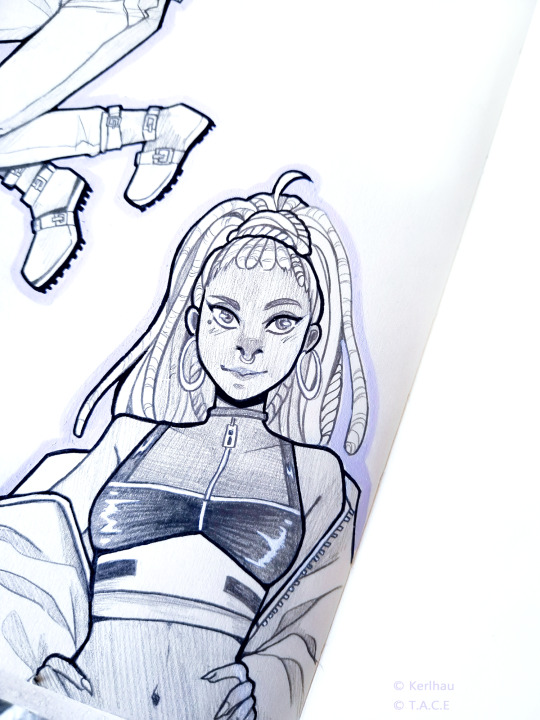

[ FR ] Ma lubie du moment : faire des dessins au crayon, avec des petites parties au feutre à pigment, et les contours et/ou motifs/fonds au posca ! ♥ ça donne un effet que j'aime beaucoup.
……………….. • 🟆 • ………………
[ ENG ] My current fad: making drawings in pencil, with small parts in pigment marker, and the contours and/or patterns/backgrounds in posca ! ♥ it gives an effect that I really like.
#dessin#drawing#illustration#draw#kerlhau#upthebaguette#wip#sketch#croquis#T.A.C.E#the alphabet city elite#oc#original character#Myriam#Morgane#artists on tumblr#the french side of tumblr#art
231 notes
·
View notes